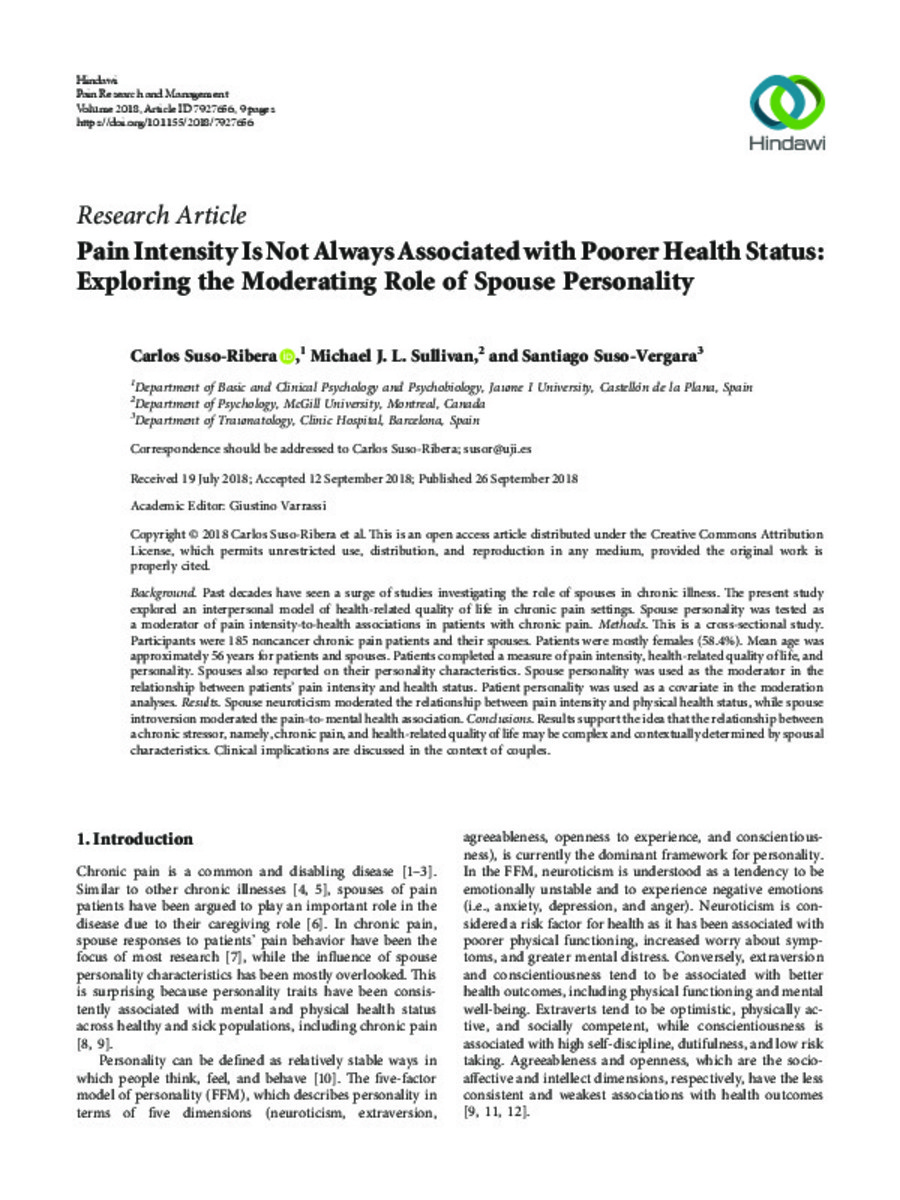Mostrar el registro sencillo del ítem
Pain Intensity Is Not Always Associated with Poorer Health Status: Exploring the Moderating Role of Spouse Personality
| dc.contributor.author | Suso-Ribera, Carlos | |
| dc.contributor.author | Sullivan, Michael J. L. | |
| dc.contributor.author | Suso-Vergara, Santiago | |
| dc.date.accessioned | 2018-11-26T12:17:56Z | |
| dc.date.available | 2018-11-26T12:17:56Z | |
| dc.date.issued | 2018 | |
| dc.identifier.citation | Carlos Suso-Ribera, Michael J. L. Sullivan, and Santiago Suso-Vergara, “Pain Intensity Is Not Always Associated with Poorer Health Status: Exploring the Moderating Role of Spouse Personality,” Pain Research and Management, vol. 2018, Article ID 7927656, 9 pages, 2018. https://doi.org/10.1155/2018/7927656. | ca_CA |
| dc.identifier.issn | 1203-6765 | |
| dc.identifier.issn | 1918-1523 | |
| dc.identifier.uri | http://hdl.handle.net/10234/177659 | |
| dc.description.abstract | Background. Past decades have seen a surge of studies investigating the role of spouses in chronic illness. The present study explored an interpersonal model of health-related quality of life in chronic pain settings. Spouse personality was tested as a moderator of pain intensity-to-health associations in patients with chronic pain. Methods. This is a cross-sectional study. Participants were 185 noncancer chronic pain patients and their spouses. Patients were mostly females (58.4%). Mean age was approximately 56 years for patients and spouses. Patients completed a measure of pain intensity, health-related quality of life, and personality. Spouses also reported on their personality characteristics. Spouse personality was used as the moderator in the relationship between patients’ pain intensity and health status. Patient personality was used as a covariate in the moderation analyses. Results. Spouse neuroticism moderated the relationship between pain intensity and physical health status, while spouse introversion moderated the pain-to-mental health association. Conclusions. Results support the idea that the relationship between a chronic stressor, namely, chronic pain, and health-related quality of life may be complex and contextually determined by spousal characteristics. Clinical implications are discussed in the context of couples. | ca_CA |
| dc.format.extent | 10 p. | ca_CA |
| dc.format.mimetype | application/pdf | ca_CA |
| dc.language.iso | eng | ca_CA |
| dc.publisher | Hindawi Publishing Corporation | ca_CA |
| dc.relation.isPartOf | Pain Research and Management, 2018 | ca_CA |
| dc.rights | Copyright © 2018 Carlos Suso-Ribera et al. (is is an open access article distributed under the Creative Commons Attribution License, which permits unrestricted use, distribution, and reproduction in any medium, provided the original work is properly cited | ca_CA |
| dc.rights | Atribución 4.0 Internacional | * |
| dc.rights.uri | http://creativecommons.org/licenses/by-sa/4.0/ | * |
| dc.title | Pain Intensity Is Not Always Associated with Poorer Health Status: Exploring the Moderating Role of Spouse Personality | ca_CA |
| dc.type | info:eu-repo/semantics/article | ca_CA |
| dc.identifier.doi | https://doi.org/10.1155/2018/7927656 | |
| dc.relation.projectID | FPU-AP2010-5585 | ca_CA |
| dc.rights.accessRights | info:eu-repo/semantics/openAccess | ca_CA |
| dc.relation.publisherVersion | https://www.hindawi.com/journals/prm/2018/7927656/ | ca_CA |
| dc.type.version | info:eu-repo/semantics/publishedVersion | ca_CA |
Ficheros en el ítem
Este ítem aparece en la(s) siguiente(s) colección(ones)
-
PSB_Articles [1329]
Articles de publicacions periòdiques
Excepto si se señala otra cosa, la licencia del ítem se describe como: Copyright © 2018 Carlos Suso-Ribera et al. (is is an open access article distributed under the Creative Commons Attribution
License, which permits unrestricted use, distribution, and reproduction in any medium, provided the original work is
properly cited








